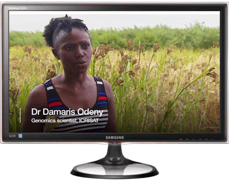Originally published : Wed, November 1, 2017 @ 2:31 PM
Updated : Tue, July 10, 2018 @ 9:08 PM
Our world population is growing at a tremendous rate and by 2050, Africa’s population alone is set to hit over 2.5 billion. This puts unprecedented pressure on our food supply chains. Fortunately there are projects such as the African Orphan Crops Consortium (AOCC) that are looking to help seed breeders deliver improved crops to the continent.
 The AOCC is a consortium that is looking to help prevent stunting associated with malnutrition, by helping breeders all over Africa improve 101 endogenous species for nutritional values, yield and disease resistance. A balanced nutritional diet is essential to a child’s brain development and cognitive capabilities, which are set from before birth to the age of 5 years old. If a child does not receive the correct nutrients in this period of their lives they are categorised to be “stunted”. They will not be able to compensate for this later in life. Their brains capacity to develop is set and they will struggle to improve their position.
The AOCC is a consortium that is looking to help prevent stunting associated with malnutrition, by helping breeders all over Africa improve 101 endogenous species for nutritional values, yield and disease resistance. A balanced nutritional diet is essential to a child’s brain development and cognitive capabilities, which are set from before birth to the age of 5 years old. If a child does not receive the correct nutrients in this period of their lives they are categorised to be “stunted”. They will not be able to compensate for this later in life. Their brains capacity to develop is set and they will struggle to improve their position.
The research needed to achieve this is underway and has already been completed for the first species with whole genome sequencing of 100 lines from each species (101) that they want to target. The species they are targeting have little or no reference genome sequence information available, and the crops have no importance internationally, and are used primarily by Africans for daily consumption, so there is no commercial interest by rest of the world. Once the sequencing information is obtained the SNP’s available will be used in a number of different applications.
With LGC’s plant kit, extraction, genotyping, and data analysis capabilities means that ANY breeder that is looking to improve any species targeted can do so without the need to set up a lab. The application of KASP in marker assisted selection (MAS) and now SeqSNP for the species that the AOCC have chosen will see enormous improvements in nutritional content and yield.
LGC has been working with plant biologists such as Dr. Damaris Odeney of ICRISAT as part of the programme. She was recently interviewed by the BBC in this short video.
To learn more about LGC's KASP genotyping chemistry click here.
To learn more about our targeted genotyping by sequencing service Flex-Seq click here.

